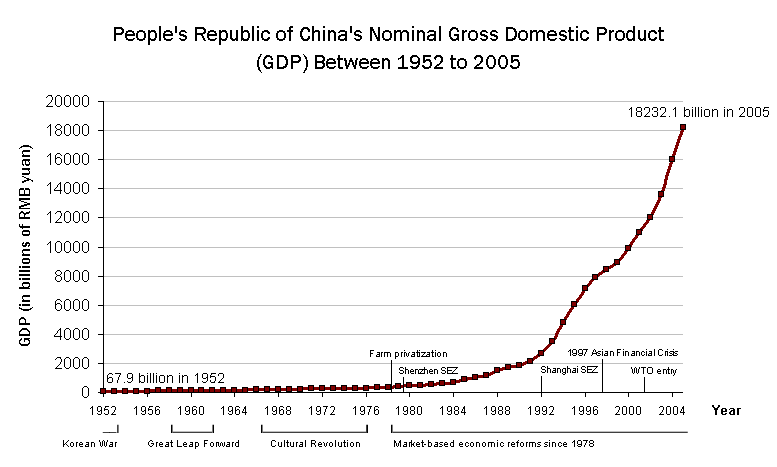Close window | View original article
Andy Stern's Chinese Lantern 3
Deng Xiaoping, the ultimate capitalist.
After a trip to China, ex-SEIU union boss Andy Stern wrote a precise, accurate description of what America must do to get our economy moving again:
America needs to embrace a plan for growth and innovation, with a streamlined government as a partner with the private sector. [emphasis added]
Coming from a man who spent his professional career increasing government employment, pay, pensions, and inefficiency as much as possible so that his union could rake in more dues, this statement that our government needs to be "streamlined" is a remarkable turnaround indeed.
What's more, he also explained the Chinese economic miracle:
...the Global Revolution—coupled with Deng Xiaoping's government-led, growth-oriented reforms—has created the planet's second-largest economy. [emphasis added]
Deng Xiaoping is one of the few leaders of great stature who was able to see that his entire outlook had to change. Having realized that his lifelong path was incorrect, he had the wisdom to make an effective 180 degree turn.
Despite his impeccable Communist credentials, Deng realized the economic failures of Marxist theory. His saying that Communism wasn't working got him into serious trouble and nearly cost him his life.
Deng Xiaoping, Capitalist Roader
Deng started getting himself in hot water with his 1961 sound bite, "It doesn't matter if the cat is black or white, as long as it catches mice." Mao Tse-Tung correctly interpreted Deng's slogan as criticism of Communist economic policies in general and of Mao's cherished Great Leap Forward in particular. Deng had lost all his positions of power within the Communist Party by 1976, the same year that Chairman Mao died.
He turned out to be a much better politician than his rivals, however. Despite holding no official Party position, he gradually outmaneuvered Mao's chosen successor Hua Guofeng and took overall power by 1980. Instead of looking to Moscow to learn how Karl Marx or Vladimir Lenin might have done things, Deng sent tens of thousands of Chinese to Singapore to learn the secrets of Singapore's economic success.
Western elites aren't the only group who have trouble admitting mistakes. Powerful people who had been connected with Mao still believed deeply in Communism and were suspicious of Deng's positive views of Singapore, that infamously evil capitalist haven. These reactionaries tried to keep China's economy firmly mired in Communist equality and its resulting poverty.
The Tiananmen Square protests and calls for democracy in 1989 frightened the old guard. The protests were led by college graduates who'd lived their entire lives under the benevolent leadership of the Communist Party. The oldsters were shocked - hadn't the students benefited from the workers' paradise?
Fortunately for Deng, they'd read enough of Confucius' writings to know that:
“Before the sovereigns of the Shang (Dynasty) had lost (the hearts of) the people, they were the mates of God. Take warning from the house of Shang.”
“… if the people have no faith (in their rulers), then there is no standing (for the state).”
When the unarmed rebels charged the army's tanks, the leaders realized that the students had lost all faith in their government and had no hope for the future. Instead of yielding to demands for democracy or slaughtering the students to stick with Communism, they chose to let Deng promise the students wealth by letting them start businesses.
They also realized an important truth our own leaders would do well to heed: there was no way to meet the students' demands for material well-being without abandoning Communist economic theory. The fact that letting people get rich would yield increased tax revenue to fund social necessities such as a space program and a world-class military wasn't lost on them either.
By 1991, Deng could say, "To get rich is glorious" without fear of contradiction or further opposition.
 |
| Deng's numbers speak for themselves! |
The 180 Degree Turn
When Britain's 99-year lease on Hong Kong ran out in 1997, the British turned their former colony over to the Chinese government as required by the treaty. The Chinese government put forth the slogan, "One country, two systems" which meant that Hong Kong would be permitted to stay capitalistic.
To be honest, we simply didn't believe it. We were so familiar with the Russian habit of sticking to Communist ideology regardless of overwhelming evidence that capitalism generated far more economic power that we couldn't believe that the Chinese would tolerate a capitalist cancer in their midst. We thought they'd crush Hong Kong over time.
We could not have been more wrong. We'd read that Deng was purged for saying it was more important for a cat to catch mice than to be politically correct. Knowing the power of political correctness in the supposedly free US, we didn't realize that Deng had not only replaced Mao's heir, he'd persuaded Mao's surviving companions to give capitalism a try.
The chart shows that by the time the Chinese took over Hong Kong in 1997, Deng's 180 degree turn was showing results - GNP had grown by a factor of 10 since he started his reforms.
Instead of harming Hong Kong, Deng used it as an infectious agent to spread capitalist ideas. Experienced Hong Kong capitalists fanned out across the land spreading the gospel of market forces and doing their best to become big-time taxpayers. The rest is history.
Deng's results-based conversion from communism to capitalism shows that even a dedicated, lifelong Communist can see the error of his economic ways.
The next article in this series takes a closer look at Andy Stern's conversion from striving to create a morbidly obese government to seeking a streamlined government which cooperates with the private sector instead of vilifying it as Mao, Roosevelt, and Obama did.
Leopards really can change their spots - Deng did - but it's rare. Has Andy changed? Or has he not?